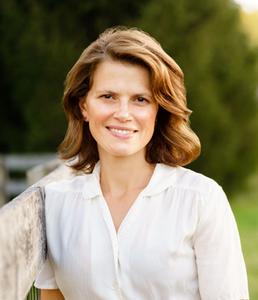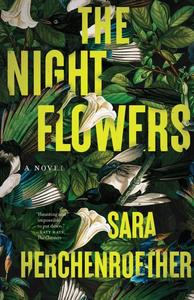
Sara Herchenroether is a teacher and lifelong writer with a passion for police procedurals. She holds a master's in teaching and is a National Board Certified Teacher in Adolescent Young Adult English Language Arts. She lives in Columbus, Ohio, with her husband and four young children. Herchenroether's debut novel, The Night Flowers (Tin House, reviewed in this issue), set in New Mexico, is a thriller featuring a young librarian named Laura who, with the help of a tough-talking female detective, summons the will to solve the mystery of an old murder, while also undergoing treatment for breast cancer.
How did the idea for The Night Flowers originate?
The Night Flowers originated as a speech Laura makes at the end when she and Jean, the detective, are up in the mountains having dinner together. She's on a tear about the word survivor--how the word conjures up both the Holocaust and the reality TV show and how that's nonsense. Laura is in the phase of cancer treatment when chemo and surgery are over, but you're in a terrible limbo, waiting to see if it worked.
I hadn't seen cancer grappled with in fiction, not with any sort of nuance that felt authentic and genuine to my own experience. Typically, cancer is plot. Kill a side character. But cancer is character. Often, we label survivors as heroes. But survivors carry guilt, they carry scars. Not everyone feels like a hero.
 Laura deploys her passion for genealogy to help people searching for loved ones, and it also sustains her as she undergoes the necessary brutality of breast cancer treatment. Is there someone in your life who was the inspiration for Laura?
Laura deploys her passion for genealogy to help people searching for loved ones, and it also sustains her as she undergoes the necessary brutality of breast cancer treatment. Is there someone in your life who was the inspiration for Laura?
Laura comes from two real-world inspirations. I gave her a lot of what I went through as a cancer patient. Her work as a research librarian was inspired by Rebekah Heath, a research librarian who helped solve the Allenstown Four. I first learned about the murders of Marylse Honeychurch, Marie Vaughn, Sarah McWaters, and the unnamed middle daughter when they did not yet have names. Their killer was identified before these victims' names--even though investigators had been trying since the '80s.
Then, Rebekah Heath, working on her own in Connecticut, where I had lived for several years and where I had undergone treatment, figured out Marylse's name within a week of investigators on the other side of the country in California. I wanted to take that idea--twin investigations coming together to solve a case--and solve the murder in a different way.
As you mentioned, the language around cancer, where words such as "battle" or "warrior" are deployed, feels disingenuous to you. What language would you prefer to use instead?
Battle and warrior imply, if the person fights hard enough, they'll win. Cancer doesn't work that way. Sometimes there's no separating why one person dies and another doesn't. If you "fight hard" enough--whatever that means--and you die, is it your fault?
If readers take anything away from reading The Night Flowers, I hope they come away with a more nuanced way of looking at cancer. If the warrior badge works for you, great. But I also hope people see it's okay to not be okay.
Readers get to know and admire Jean through expertly crafted chapters showcasing police culture, homicide procedures, and the particular sarcastic humor one associates with favorite detective characters. What experience did you draw on to create these entertaining scenes?
The sarcasm comes from my family. We show love best through verbal jabs. My former students would say the sarcasm comes from Mrs. Herchenroether.
As for police procedure, I listen to a lot of police podcasts. I have a giant procedural textbook I haul out from its hiding place when I want to make sure I have something right. I have a real admiration for the people who make it their life's work to investigate violent crime. They too carry scars.
Laura and Jean could not be more different temperamentally and in their life experiences, yet they work well together. What is the magic ingredient in their successful partnership?
I wrote The Night Flowers before Hacks came out with Jean Smart and Hannah Einbinder. When it did, I thought, Okay, someone else has been thinking about this dynamic. And by that, I mean an older, world-weary woman mentoring a younger, haven't-quite-figured-things-out-yet 30-something-year-old. Or maybe I simply watched Return of the Jedi on VHS too many times as a kid. They're Obi-Wan and Luke, but women, with sarcasm and murder.
The third narrator, the deceased woman, brings an intriguing supernatural twist to the story. Was it difficult to write from her perspective?
Writing from Jane Doe's perspective was the most challenging. Jean and Laura's voice came far more naturally. It wasn't until I came upon the myth of Echo that Jane Doe began to reveal herself.
In the story, Echo, the nymph, falls out of favor with Juno. Sometimes she's described as tricking Juno, sometimes she's described as constantly talking, but either way, she goes and tells Juno that her husband has been messing around, and Juno condemns Echo to only repeat back what others say. Someone who is constantly talking, I thought, is someone who is seeking outside validation. If you get heard by the wrong type of person--a Narcissus--bad things can and will happen.
Were you a writer as a child?
I spent a lot of time by myself as a child. I was a voracious reader, and I had (have) an overactive imagination. So, yes. I wrote little stories, and in the sixth grade, wrote a novel, generously described as Jurassic Park fan fiction, if told from the point-of-view of the girl. I photocopied my handwritten pages, copied addresses from the copyright pages of books and shipped them off to New York, warning in my cover letter that I'd accept the first offer I received. Strangely, it never sold.
What is your advice for aspiring writers who struggle to find the time to write?
If you are a writer, you will find time to write because you'll have no other choice. A story will be crawling under your skin. The only way to expel the monster is to get it on paper. I wrote The Night Flowers during the pandemic, with four kids at home. I got up before them to write while my husband took the breakfast shift and found another hour in the afternoon while the youngest two napped. It can be done.
Readers will surely want to see Laura and Jean again. Will there be a sequel to The Night Flowers? What are you working on?
A few other early readers asked if The Night Flowers was the beginning of a series. If another story comes through for Laura and Jean, I'll go back to New Mexico. It's a place I fell in love with. My next book is set where I grew up, Massachusetts. It's a literary police procedural with two new detectives and plenty more sarcastic police banter. It has a book-within-a-book, and the book is an Irish myth retelling. It's about being able to return home, who gets to and who doesn't, and why. --Shahina Piyarali

